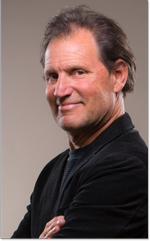
Bill English, Artistic Director
It occurred to me last month while writing “The First Story,” that I was just grazing the tip of the iceberg of the subject of “storytelling.” Certainly, in the theatre it is our life’s blood and the very reason for our existence. As an Artistic Director, it defines my purpose, to decide which stories to tell. It is a process I am immersed in now, as I work on selections for our fifteenth season. So, I think the next few months will bring a series of posts about “story” and its place in our life and on our stage.
We humans are completely addicted to story. Whether it is a novel, a movie, a play, a comic strip, a conspiracy theory, a political platform, a religion or a simple rumor, we gravitate to stories like a magnet to iron. We cannot resist the temptation to make stories. Even when presented with unrelated facts, we will immediately start concocting a story to connect them. It follows then that stories can be used to control and manipulate us, as well as to educate and unify.
Stories may be the most addictive thing in the world. Our human minds are helpless in the grip of a story. We may struggle, but no matter how hard we try, we cannot resist the lure of a good tale. And that can be a very dangerous thing. Because when we encounter a story, whether on stage or on the page, we willingly suspend our disbelief and set aside our suspiciousness and accept the precepts of the story as true. We trust the storyteller to be representing their fictional world fairly since we will be putting ourselves helplessly in their grip as we are taken on a ride through a world into which the storyteller lures us.
Each storyteller has a “world view” that they impose on us; they are the God of their little universe and we are the willing tourists. Some portray a world where positive moral values win the day, while some have a more cynical view of mankind. Some believe humans can change, while others see change as impossible. Some portray happy endings where love triumphs, while others paint a more somber view of protagonists fated to be brought down by their tragic flaws. Some blame inequity or corruption for trapping their characters in cycles of hopelessness, while others allow their humans a chance to really change the world.
“Given that we approach each story with a willingness to believe, <br> does a playwright have a responsibility to create fictional worlds <br> that will have a positive effect on our real one?”
Given that we approach each story with a willingness to believe, does a playwright have a responsibility to create fictional worlds that will have a positive effect on our real one? Or is it enough to simply mirror the world back to us accurately? How do playwrights intend to affect their audience? To get them to see a truth they feel people are missing? To suggest that we need to change our attitudes or those around us? To get us to accept the toughness of the world and not have false hopes? Or to suggest that hope is what keeps us going when times are tough?
With the tremendous changes taking place recently in our culture, changes which will continue to have profound effects on us, what is the responsibility of the Artistic Director when he chooses which art to provide to his story-crazed patrons? What plays will most serve our divided nation? In this most liberal of cities, it seems a waste of energy to preach to the choir. What is it we don’t know? We express shock and confusion that half of our country’s citizens feel so differently from the majority of San Franciscans. If theatre’s purpose is to breed understanding, what plays will foster a greater understanding of those who disagree with us?
The next play in our season, The Christians by Lucas Hnath, may be one of these plays. Set in the heartland, it takes aim at religious belief—not to disparage it, but to understand what drives belief. It asks, “Where is the boundary between fear-driven belief and compassion-driven belief?”
As far as next season, the search is on. We may go back to some American classics to see if we can still recognize the country they represent. As for new work, what do our playwright/prophets have to say right now about the schism in our culture? Since we are such gluttons for story, since we give over so easily, suspend our disbelief with such abandon, it is incumbent on we storytellers to take that faith very seriously. It is our duty not to pour work into our patron’s hearts that will make them feel “superior” or deepen division, but to find unifying factors that will help pull us together as a city, a nation, and a world.

Bill
Latest posts by Bill English (see all)
- The Glass Menagerie – A Note from the Artistic Director - April 2024
- The 39 Steps: A Note from the Artistic Director - March 2024
- My Home on the Moon – A note from the Artistic Director - January 2024




If you ask me, the six most irresistible, seductive, powerful words in the English language are “Let me tell you a story.” We wait for it. We listen. We remember the story–the numbers, not so much. Because stories carry meaning and deliver it straight to our hearts. (I say this as a business school grad–MBA, yes, that’s me–and writer who’s worked with a lot of executives across most every industry you can name.) Every gifted leader I know relies (instinctively) on the power, the honesty of stories. They show us who we are.
nancy, thanks for the lovely comment. Beautifully put!
Well said & good luck with your project; you have been right on so far. ? Hope to see you all in the near future.
Well said Bill: I believe your plan of action is very appropriate. Diversity is the name of the game of politics in this country & the art & scince of story telling should appropriately reflect that reality. So far you have seemed to master that skill with ease.
Hope to see you in the near future & best of luck.
Sev Teufel